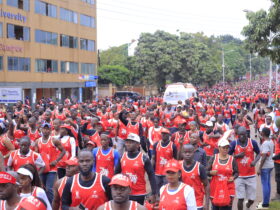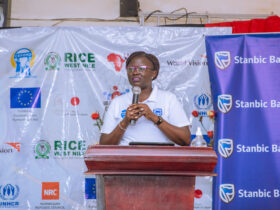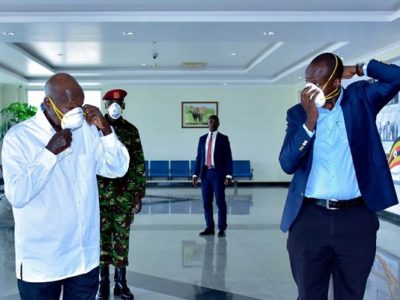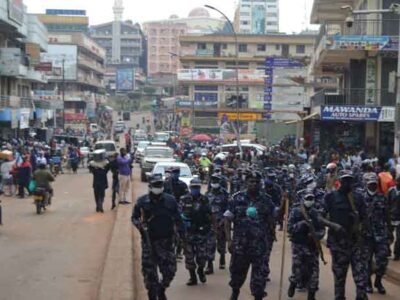The death toll in the Mbale flash floods has risen to 29, with the government detailing the extreme havoc caused in the Mt Elgon plains.
Rescuers were by yesterday still trying to find five missing people, more than 48 hours after the Saturday night disaster, and hopes of finding the victims alive had, according to volunteers, faded.
Giving the first comprehensive official account at a press conference at Uganda Media Centre yesterday, Refugees and Disaster Preparedness Minister Hillary Onek said the floods swept away 14 bridges, nine cars and three motorcycles.
Nine institutions of learning were either partially or fully damaged alongside three health centres.
More than 700 domestic animals, 4,500 poultry were killed and 15 fish ponds were destroyed, according to the government statistics.
Mr Onek said at least 800 households have been affected by the floods, with 80 houses damaged, leaving thousands homeless.
Rivers Nabuyonga, Namatala, Nashibiso and Napwoli burst their banks after constant downpour lasting more than a week loosened soils and created a deluge of runoff water from the mountain slopes.
Residents said the more intense rain that caused the flash floods started at 10pm on Saturday and ended Sunday afternoon.
The districts most affected by the disaster include Mbale, Kapchorwa, Bulambuli, Manafwa, Sironko and Namisindwa, all prone to rainfall havoc due to their location on the foot of Mt Elgon.
Mbale City also reported major damages to humans and infrastructure.
“The most affected areas were in Mbale City, with more deaths recorded, vehicles damaged, houses, schools and livestock destroyed, among others,” Mr Onek said.
Twenty-three people died in Mbale alone, three in Kapchorwa and three in Sironko.
Mr Onek said the five missing people were passengers in an ill-fated vehicle and on a boda boda that violent waters plunged into the river.
By yesterday, rescuers had recovered only three out of nine vehicles swept into the murky river waters.
The runoff water also destroyed vast farmlands of cereals, vegetables, banana plantations, tomatoes, onions, coffee, rice and cabbage.
Government estimated flattened gardens at 5,000 acres.
Ms Rodha Nyaribi, the Mbale City senior environment officer, said the figures were preliminary, suggesting more destruction could be confirmed.
“We are still doing rapid assessment tests, but so far, we have established that about 1,500 people have been directly affected. The assessment is still ongoing,” she said.
The most affected wards in the city, Ms Nyaribi said, are Dolor, Nabitiri, Namakwekwe, Namatala and Mutoto.
Others are Mooni, South Central, Islamic University In Uganda, Nabijjo, and Booma.
The senior environment officer blamed the flash floods on rampant encroachment on river banks, especially in the city suburbs, through mainly settlement and farming.
“The flash floods are because of a lot of degradation, especially upstream hills due to settlement and poor agriculture practices,” she said.
Ms Nyaribi said people need to move away from river banks so that the ecosystem is restored and preserved.
Mr Muhammed Mafabi, the Mbale District chairperson, said about 1,654 people were affected and 124 houses were destroyed.
He identified Bungokho, Bumbobi, Wanale, Budwale and Nyondo as the most-affected sub counties.
“Most of those whose houses were washed away are staying with neighbours, friends and relatives and we want the government to find a solution to this,” he said.
The Prime Minister, Ms Robinah Nabbanja, during a fact-finding visit at the weekend, directed locals living near the river banks in Bugisu and Sebei to voluntarily vacate in order to save lives as heavy rains continue to pound the area.
“I was here two weeks ago and the President was here and he was very categorically clear that people who are destroying the environment will bring us problems. This disaster is due to environmental degradation,” she said.
She added: “I believe it could have been avoided if our people had not degraded the river banks.”
As the floodwaters subsided, locals turned attention to repairing the damage wrought by the floods.
Ms Richard Walimbwa, one of the affected locals and a resident of Busamaga, told Daily Monitor that they are currently homeless.
“The floods brought down my house and as I speak now, I am homeless. I have nowhere to go,” he said.
Many of the affected were yesterday clearing debris out of their buildings.
Ms Joan Wasagali, another victim, said: “We have nowhere to go now unless the government relocates us to a safer place. We cannot move on our own because we have no money.”
The displaced people are living in misery and bracing for harder times amid warnings by the weatherman of more and intense rains in mainly northern and eastern Uganda.
Mr Onek said the government is slated to purchase tents for people whose houses were destroyed beyond repair.
Govt action
Mr Onek said the government has taken both short and long-term measures to ensure the affected people are helped.
The minister said the government has sent rapid assessment teams from the Office of the Prime Minister, under which the ministry of Disaster Preparedness falls, World Health Organisation and Uganda Red Cross Society to ascertain the extent of the damage and find a way forward.
He said the police, with the help of the Uganda Red Cross, have been deployed to search, rescue or retrievee persons or bodies in the rivers.
Health workers are also on the ground to respond to medical emergencies.
“Delivering of relief items to the intended beneficiaries and survivors is also [being] done by my ministry and Uganda Red Cross Society,” the minister said.
He said the government is exploring how to fast-track restoration of damaged roads and bridges so that economic activity can resume.
“The long term solution is to have everyone living on the slopes of Mt Elgon and along the river banks relocate to a safer geographical landscape,” Mr Onek said.
*****************
Daily Monitor












